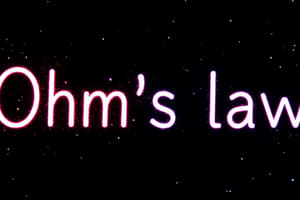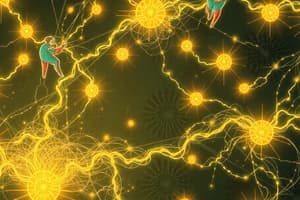Podcast
Questions and Answers
Which international system of units is commonly used in physics?
Which international system of units is commonly used in physics?
- International System of Units (SI) (correct)
- Imperial units
- Customary units
- Metric system
What are the two fundamental theories of applied physics related to electric circuits?
What are the two fundamental theories of applied physics related to electric circuits?
- Thermodynamics and fluid dynamics
- Quantum mechanics and relativity theory
- Particle physics and nuclear physics
- Electric circuit theory and electromagnetic theory (correct)
What does an electric circuit consist of?
What does an electric circuit consist of?
- A motor, a switch, and a resistor
- A voltmeter, an ammeter, and a capacitor
- A generator, an inductor, and a diode
- A battery, a lamp, and connecting wires (correct)
What is the interconnection of electrical elements known as?
What is the interconnection of electrical elements known as?
Which law relates the voltage, current, and resistance in an electric circuit?
Which law relates the voltage, current, and resistance in an electric circuit?
Which unit is used to measure the speed of electron motion?
Which unit is used to measure the speed of electron motion?
What unit is used to measure electric potential?
What unit is used to measure electric potential?
Which of the following represents the charge of 4,600 electrons?
Which of the following represents the charge of 4,600 electrons?
What type of current is relevant in the circuits discussed in the course?
What type of current is relevant in the circuits discussed in the course?
How much charge is represented by six million protons?
How much charge is represented by six million protons?
Study Notes
International System of Units
- The International System of Units (SI) is commonly used in physics.
Fundamental Theories of Applied Physics
- The two fundamental theories of applied physics related to electric circuits are Kirchhoff's Laws and Thevenin's Theorem.
Electric Circuits
- An electric circuit consists of resistors, capacitors, inductors, and power sources, interconnected by wires.
Electrical Elements
- The interconnection of electrical elements is known as a network.
Ohm's Law
- Ohm's Law relates the voltage, current, and resistance in an electric circuit.
Units of Measurement
- The unit meter per second (m/s) is used to measure the speed of electron motion.
- The unit volt (V) is used to measure electric potential.
Charge
- A charge of 4,600 electrons represents 7.4 x 10^-17 C.
- Six million protons represent a charge of 9.6 x 10^-7 C.
Type of Current
- The type of current relevant in the circuits discussed in the course is Direct Current (DC).
Studying That Suits You
Use AI to generate personalized quizzes and flashcards to suit your learning preferences.
Description
Test your knowledge of electric circuit theory, electromagnetic theory, and the fundamental principles of electrical elements including electric current, voltage, power, energy, and Ohm's law. This quiz covers the International System of Units (SI), charge and current, circuit elements, and more.





